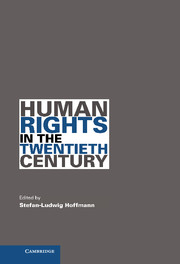Crossref Citations
This Book has been
cited by the following publications. This list is generated based on data provided by Crossref.
Nehring, Holger
2011.
‘Civility’ in history: some observations on the history of the concept.
European Review of History: Revue europeenne d'histoire,
Vol. 18,
Issue. 3,
p.
313.
Demshuk, Andrew
2012.
What was the “Right to theHeimat”? West German Expellees and the Many Meanings ofHeimkehr.
Central European History,
Vol. 45,
Issue. 3,
p.
523.
Moyn, Samuel
2012.
Substance, Scale, and Salience: The Recent Historiography of Human Rights.
Annual Review of Law and Social Science,
Vol. 8,
Issue. 1,
p.
123.
Romano, Angela
and
Romero, Federico
2014.
European Socialist regimes facing globalisation and European co-operation: dilemmas and responses – introduction.
European Review of History: Revue européenne d'histoire,
Vol. 21,
Issue. 2,
p.
157.
Burke, Roland
2015.
Human Rights Day after the ‘breakthrough’: celebrating the Universal Declaration of Human Rights at the United Nations in 1978 and 1988.
Journal of Global History,
Vol. 10,
Issue. 1,
p.
147.
Burke, Roland
2017.
Flat affect? Revisiting emotion in the historiography of human rights.
Journal of Human Rights,
Vol. 16,
Issue. 2,
p.
123.
Risse, Mathias
2020.
On Justice.
2020.
Human v. Religious Rights?.
p.
153.
Søndergaard, Rasmus Sinding
2020.
Reagan, Congress, and Human Rights.
Halme‐Tuomisaari, Miia
2020.
Guarding utopia: law, vulnerability and frustration at the UN Human Rights Committee.
Social Anthropology,
Vol. 28,
Issue. 1,
p.
35.
Wedin, Tomas
2023.
On the French Origins of Samuel Moyn’s the Last Utopia.
Global Intellectual History,
p.
1.
Backes, Uwe
and
Lindenberger, Thomas
2024.
Einführung.
Totalitarianism and Democracy,
Vol. 20,
Issue. 2,
p.
135.



